It’s still too early to definitively answer any of the burning questions about the COVID-19 omicron variant, but some early evidence is giving U.S. health officials glimpses into what they might be dealing with, Dr. Anthony Fauci said Tuesday.
What You Need To Know
- It’s still too early to definitively answer any of the burning questions about the COVID-19 omicron variant, but some early evidence is giving U.S. health officials glimpses into what they might be dealing with, Dr. Anthony Fauci said Tuesday
- The three big, unanswered questions are whether the variant is more contagious, whether it is more likely to cause severe illness and whether it is more likely to evade vaccines
- Early indications, Fauci said during a news briefing, are that the strain is indeed more transmissible but not as severe
- It also appears people who were infected with earlier COVID-19 variants are showing a tendency to be reinfected with omicron
The three big, unanswered questions are whether the variant is more contagious, whether it is more likely to cause severe illness and whether it is more likely to evade vaccines.
Early indications, Fauci said during a news briefing, are that the strain is indeed more transmissible but not as severe. It also appears people who were infected with earlier COVID-19 variants are showing a tendency to be reinfected with omicron, while tests are underway to determine whether the same holds true for antibodies generated by vaccines.
But Fauci, director of the National Institute of Allergy and Infectious Diseases and President Joe Biden’s chief medical adviser, cautioned against drawing any conclusions about omicron for at least a couple more weeks.
Fauci said South Africa is seeing a correlation between omicron cases and a spike of COVID-19 cases overall — and a significantly higher rate virus reproductive rate — which all point to the variant being more transmissible.
However, anecdotal evidence out of South Africa suggests the variant might be less severe than prior strains. Fauci said that is based on a lower ratio of hospitalizations to new cases, shorter hospital stays and less need for patients to receive supplemental oxygen.
But Fauci noted that many of the people in South Africa who have been infected with the omicron variant are relatively young and that data on COVID-19 hospitalizations and deaths usually lag weeks behind surges in infections.
“It is very likely that the last thing that we'll get a good handle on will be the broad severity or not of the infection,” Fauci said.
Meanwhile, a study out of South Africa found that omicron is associated with substantial ability to evade immunity from prior infections. The research has not yet been peer reviewed.
Fauci said lab studies are being conducted to determine whether the variant diminishes the effectiveness of existing vaccines.
Dr. Rochelle Walensky, director of the Centers for Disease Control and Prevention, said omicron cases have now been confirmed in 19 states, a number she expects to rise. But she added that while U.S. officials are taking omicron very seriously, the delta variant still accounts for more than 99% of U.S. cases and cannot be ignored.
“Right now we're seeing about 100,000 new cases of COVID-19 each day in the United States,” Walensky said. “We must act together in this moment to address the impact of the current cases we are seeing, which are largely delta, and to prepare ourselves for the possibility of more omicron. We must act in this moment to mobilize together to do what we know works. We have months of study on delta, and all of those data to demonstrate that vaccines work, testing works, masking works and that ventilation works.
“While we are still working to understand the severity of omicron, as well as how it responds to therapeutics and vaccines, we anticipate that all of the same measures will at least in part provide some protection against omicron,” Walensky added.
Jeff Zients, White House COVID-19 response coordinator, announced that the U.S. has hit a couple of vaccination milestones. As of Tuesday, 5 million children ages 5 to 11 will have received their first vaccine shot. And the U.S. has now donated more than 300 million doses to 110 countries, Zients said.
In addition, 12.5 million Americans have received vaccine doses in the past week, the most since May. Nearly 7 million of those were booster shots.
Ryan Chatelain - Digital Media Producer
Ryan Chatelain is a national news digital content producer for Spectrum News and is based in New York City. He has previously covered both news and sports for WFAN Sports Radio, CBS New York, Newsday, amNewYork and The Courier in his home state of Louisiana.








